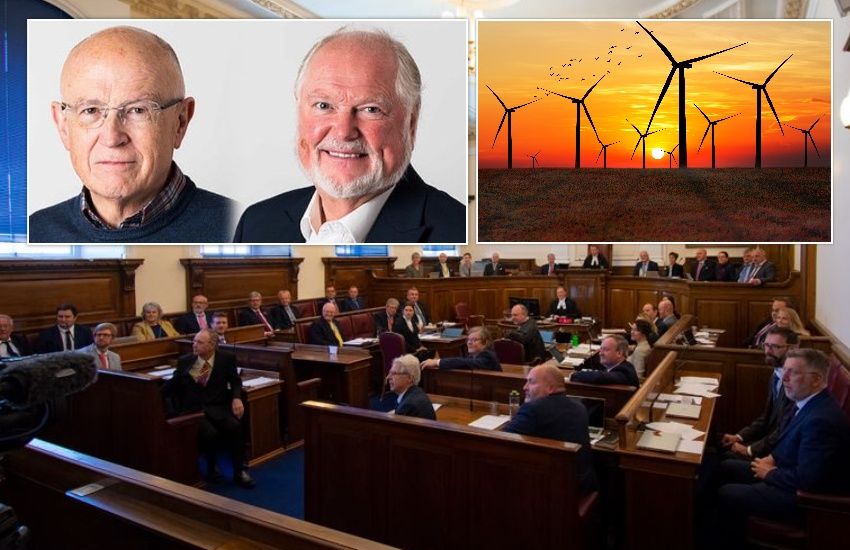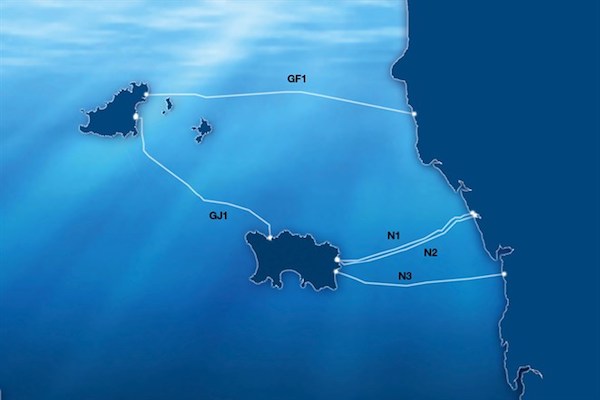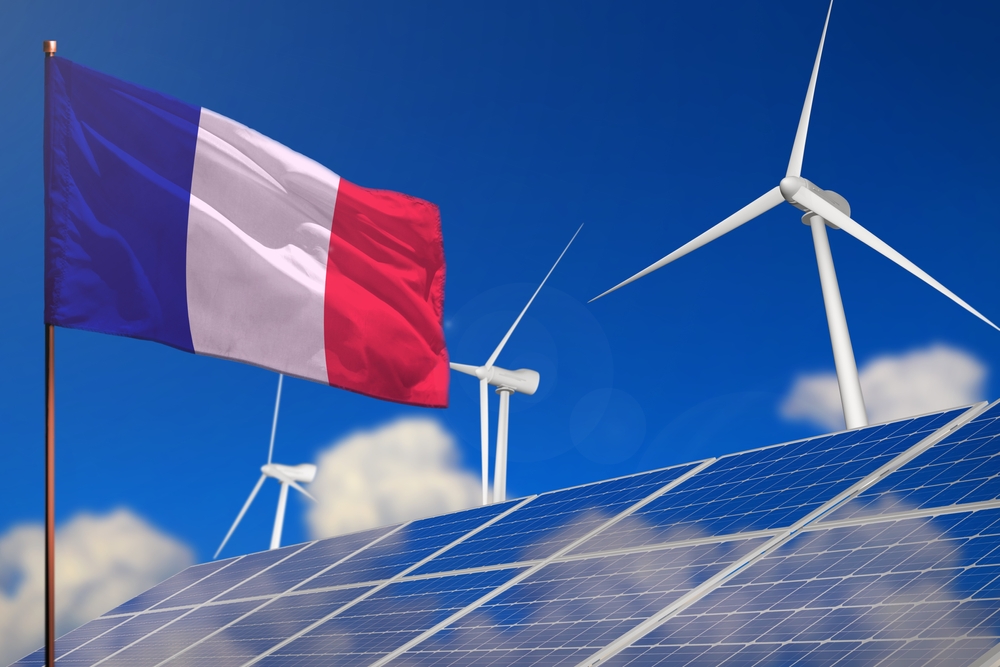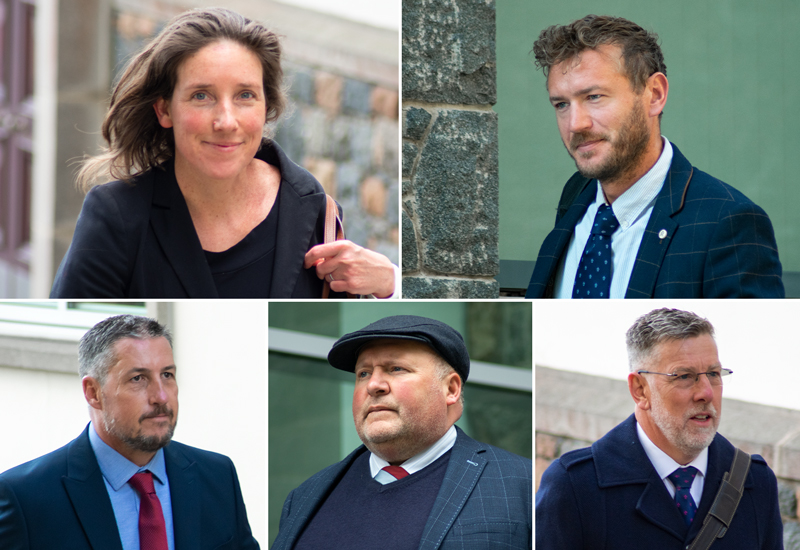


A local think tank is urging the States to speed up plans for renewable energy.
The Guernsey Policy & Economic Group (GPEG) believes there are now strong economic as well as environmental reasons to boost investment in renewable energy.
It is also warning that failure to accelerate a move to renewables would leave the island vulnerable if future negotiations with France were unable to secure adequate electricity supply at reasonable cost through the cable links with Jersey and Normandy, which currently supply nearly all the island's needs.
GPEG wants the States to give higher priority to assessing the potential for joint renewable projects with France as well as Bailiwick-only projects as an insurance policy.

Pictured: Most of Guernsey's electricity needs are currently supplied through an undersea cable to Jersey, which in turn is supplied through three undersea cables to France.
"Times have changed. Renewable power is currently a lot cheaper than oil-derived power and the sooner we get that power - our own or perhaps French - the cheaper it will be for Guernsey consumers," said GPEG.
"Economics now favour renewables and decarbonisation has become an economic thing to do - [and] 'green' is a welcome further reason to go alternative.
"We should be getting on urgently with preparations for wind and solar – whatever the timing of the negotiations [with France] – so that we minimise the damage from a no-deal outcome. It would, of course, also help the negotiating position of Guernsey with our French suppliers.
"Essentially, we want to access cheaper renewable or nuclear power from France or we will have to build renewables ourselves."

Pictured: GPEG believes that accelerating the development of renewable energy would help the States in negotiations with France over the long-term future of electricity supply from the European grid.
The Committee for the Environment & Infrastructure is preparing an electricity strategy which it intends to take to the States' Assembly for debate in the first three months of 2023. The Committee issued a consultation document earlier this year to support discussions with local stakeholders, such as energy companies. GPEG has criticised aspects of the document as complacent.
"The island has issued a substantial consultation document on future electricity supply for Guernsey. It is accompanied by two expensive consultants' reports, which add remarkably little to the debate, from PwC and Siemens. Amazingly, the document just assumes that the supply from France will continue for the next 30 years," said the think tank.
"Our current contractual position [with France] needs renewing as soon as 2024...certainly, it totally expires in 2027. The background will be that the French will almost certainly be sore from the export of cheap power to Guernsey under the current contract. Even more so if they have to write cheques to Guernsey this winter.
"Particularly at peak demand times, they are likely to find it very expensive – or even impossible - to keep the heating on in French homes this winter. Not great politics if we are all cosy in Guernsey whilst the French voters shiver in candlelit twilight.
"The volatility of electricity prices, and general inflation, in recent times will mean any form of fixed price contract will be difficult to agree. In any case, over 30 years or so, there is a definite probability - anyone’s guess as to what probability - that relations with the French would become unfriendly with obvious implications for power supply. Some would say this risk is too high and we must aim for self-sufficiency."

Pictured: The Committee for the Environment & Infrastructure is less than six months away from submitting a comprehensive electricity strategy to the States for debate.
GPEG is concerned about the twin risk of the island failing to reach further long-term deals with France for electricity through the cable links and at the same time having made limited progress developing renewable energy alternatives.
"If we cannot get a satisfactory long-term solution with the French, then we have to be ready to move to nearly 100% oil-derived power. Over 10 to 15 years, we can greatly reduce that percentage with wind and solar and batteries. And then perhaps there will be a good route to lower carbon generation from different technology," said GPEG.
"It is unwise to underestimate the ability of our politicians to delay the issue. Doing basically nothing before the next election is possible and far from unlikely.
"Making no decisions until the success or, more likely, failure of the negotiations with the supplier - to be concluded post-election, if that much delay can be procured - is also possible.
"As long as we have good on-island oil-fired power, at least the lights will stay on, but you do kick decarbonisation out to later dates."

Pictured: Deputies David De Lisle (left) and Carl Meerveld are among an independent group of deputies who intend shortly to publish their ideas about how the island could advance opportunities to develop renewable energy.
The electricity strategy being prepared by the Committee for the Environment & Infrastructure also looks set to be preceded by reports on opportunities to develop renewable energy which are currently being finalised by an independent group of deputies.
As revealed by Express today, 14 deputies who have been working behind the scenes for a year are only days away from presenting their ideas about how best to develop solar, tidal and wind power and the obstacles which would need to be overcome first.
Deputy Carl Meerveld told Express that the independent group of deputies were approaching the task "in a more business-like manner by identifying opportunities first [and] then considering obstacles to pursuing those opportunities, which may include States’ policies...[it's] an opposite approach to the one taken by many States' committees and civil servants, who often try to establish a policy direction and then only consider opportunities which fit with that policy direction".
Pictured (top): GPEG's Jon Moulton (left) and Lord Digby Jones (right).
Independent group of deputies to unveil renewable energy ideas
States' consultation for electricity strategy "imminent"
Energy concerns dominate debate
OPINION: "Island needs accurate information about energy policy"
OPINION: "The States must wake up on energy and the environment"
E&I President astonished by GPEG's scathing criticism of energy policy
The energy transition: What is the regulator’s role?
Alderney "working together with Guernsey" on renewable energy
Comments
Comments on this story express the views of the commentator only, not Bailiwick Publishing. We are unable to guarantee the accuracy of any of those comments.